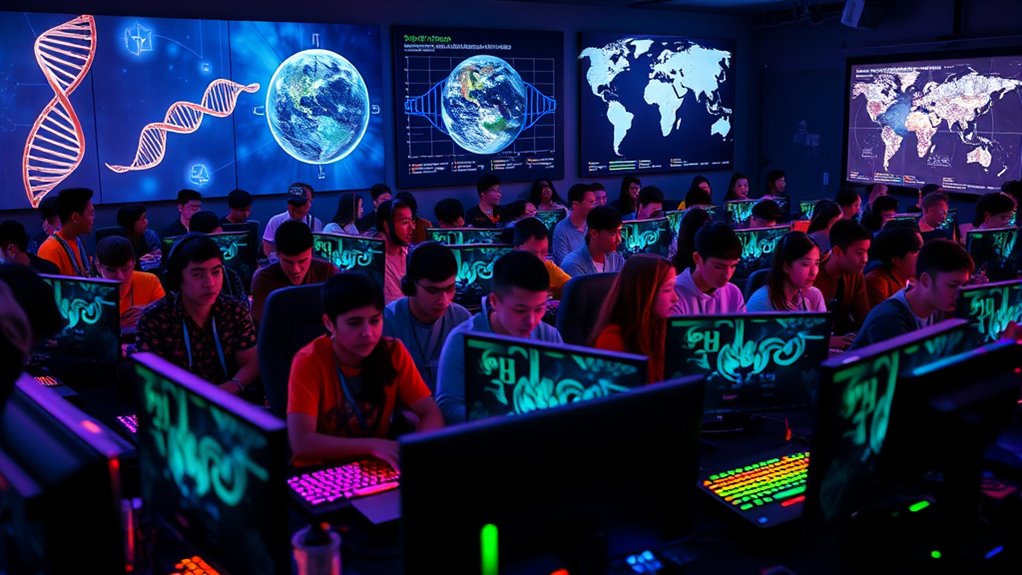Imagine a puzzle where thousands of people work together from their homes to solve complex scientific mysteries—this is the essence of crowd-sourced science through gaming platforms. These interactive tools turn research challenges into engaging tasks, making participation accessible and rewarding. As more volunteers contribute, the potential to accelerate discoveries grows. But how do these platforms guarantee accuracy and truly benefit scientific progress? Exploring this innovative approach reveals a new way science and community can unite.
Key Takeaways
- Gaming platforms transform scientific tasks into engaging challenges, motivating volunteers to contribute to real research problems.
- Citizen scientists collaboratively classify data, identify patterns, and validate results to ensure accurate, trustworthy datasets.
- Gamification promotes sustained participation and skill development, accelerating research progress and data analysis.
- Crowd-sourcing through games enables large-scale participation, solving complex scientific questions efficiently and inclusively.
- These platforms foster a synergy between volunteers and professionals, advancing science through innovative, community-driven efforts.

Crowd-sourced science harnesses the collective efforts of volunteers and citizen scientists to advance research projects that once relied solely on professional researchers. When you get involved in these initiatives, you become part of a larger community contributing to real scientific progress. One of the key strengths of this approach is citizen participation, where everyday people help gather, analyze, and interpret data. This democratization of science means that you don’t need specialized training to make a meaningful impact. Instead, you can contribute by classifying images, recording observations, or helping spot patterns that might otherwise go unnoticed. Your participation accelerates research timelines, often turning what would take years into a matter of months or weeks.
However, with so many people involved, ensuring the accuracy of the data becomes essential. That’s where data validation comes into play. In crowd-sourced science, your input is often cross-checked by other volunteers or automated algorithms to verify its reliability. This collective validation process helps filter out errors and confirms findings, making the results trustworthy. You might be surprised to learn that your contributions, when combined with those of others, create a robust dataset that professional scientists can confidently analyze. This process also encourages learning, as you gain insights into the scientific method and how data integrity is maintained. Additionally, automation in data analysis enhances business intelligence, enabling faster and more precise interpretation of large datasets.
Many gaming platforms have adopted this crowd-sourcing model, turning scientific tasks into engaging challenges. By gamifying research, these platforms motivate you to participate regularly, making data collection and analysis feel less like a chore and more like an enjoyable activity. For example, you might be tasked with identifying galaxy shapes, transcribing ancient texts, or mapping ecological changes—all through fun, interactive interfaces. As you play these games, your citizen participation directly contributes to solving complex questions in fields like astronomy, ecology, and medicine. The competitive or collaborative nature of these platforms also fosters a sense of community, encouraging you to improve your skills and help others in the process.
Your involvement in crowd-sourced science through gaming platforms exemplifies how citizen participation and data validation work hand-in-hand to produce meaningful research outcomes. It’s a way to use your curiosity, skills, and time to help push the boundaries of knowledge. By engaging with these platforms, you’re not just playing; you’re actively making a difference in real-world scientific discoveries. This synergy between citizen scientists and professional researchers is transforming how science is done, making it more inclusive, efficient, and innovative. So, the next time you pick up a game that contributes to research, remember—you’re helping solve some of the biggest challenges facing our world today.
Conclusion
By joining these platforms, you’re not just solving puzzles—you’re planting seeds of discovery in a vast garden of knowledge. Every click and classification is a drop of water nurturing future breakthroughs, and your efforts form the threads weaving a tapestry of progress. Together, we become the architects of change, transforming individual actions into a powerful force for global understanding. In this shared pursuit, your participation becomes the key to revealing nature’s deepest secrets.









